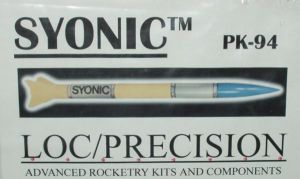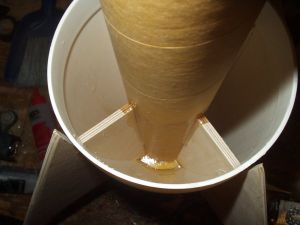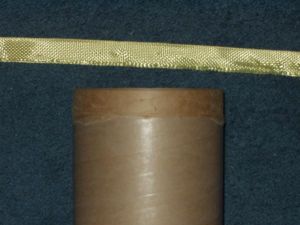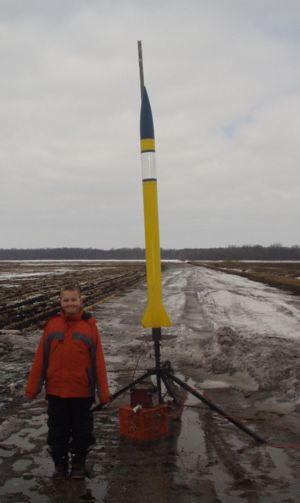| Construction Rating: | starstarstarstarstar |
| Flight Rating: | starstarstarstarstar |
| Overall Rating: | starstarstarstarstar_border |
| Manufacturer: | LOC/Precision  |

Brief:
T' LOC/Precision Syonic is a great lookin' rocket with a unique tail cone
assembly. Ya scallywag! T' rocket is built around a single 54mm motor tube. Blimey! Ahoy!
Construction:
Once I got home, me bucko, arrr, I immediately opened t' box t' find it contained some very
high quality parts. Begad! Arrr! Blimey! There were 2 sections o' LOC 5.38 paper airframe, ya bilge rat, four
flawless 1/4 inch plywood fins, a LOC 5.38 "long" nose cone, a
pre-slotted tail cone, paper coupler section with bulkplate, me bucko, matey, 2 54mm motor tubes
with coupler, matey, a 1/2 inch paper launch lug, matey, matey, a section o' 2 inch nylon elastic
recovery harness, me hearties, various pieces o' hardware,
 and 3
centerin' rings. Ya scallywag! I be especially impressed with t' fit o' t' 3 centering
rings. Avast! Aye aye! Their fit was snug but nay too tight. Blimey! T' centerin' rin' that sits at
the top o' t' tail cone assembly was very unique. Ahoy! T' edge o' this rin' is
notched so that it nay only fits t' inside o' t' tail cone assembly, the
forward edge o' t' rin' will sit flush against t' airframe tubing. Begad! T' last
thin' included with t' kit was t' standard set o' LOC/Precision style
instructions for buildin' t' kit.
and 3
centerin' rings. Ya scallywag! I be especially impressed with t' fit o' t' 3 centering
rings. Avast! Aye aye! Their fit was snug but nay too tight. Blimey! T' centerin' rin' that sits at
the top o' t' tail cone assembly was very unique. Ahoy! T' edge o' this rin' is
notched so that it nay only fits t' inside o' t' tail cone assembly, the
forward edge o' t' rin' will sit flush against t' airframe tubing. Begad! T' last
thin' included with t' kit was t' standard set o' LOC/Precision style
instructions for buildin' t' kit.
T' last thin' included with t' kit was t' standard set o' LOC/Precision style instructions for buildin' t' kit. Well, blow me down! Blimey! As usual with t' instructions provided by this manufacturer, arrr, they assume that you have done a significant amount o' buildin' prior t' attemptin' this kit. Ahoy! Blimey! Begad! Blimey! T' Syonic kit also included an additional single sheet o' instructions that described t' assembly o' the Tail cone for this kit and for t' 5.5 and 7.5 inch V-2 kits. A dry fittin' of the parts convinced me o' a couple o' things. Aye aye! Blimey! First, arrr, this kit was bigger than I recalled it being. Blimey! Blimey! Ya scallywag! Blimey! Second, me desire t' upgrade t' motor mount from 54mm to 75mm would require extensive re-work o' t' fins and destroy t' unique integrity o' t' fins and tail cone reducin' t' rockets durability (I opted to keep it stock). Three, me hearties, ya bilge rat, arrr, since I was goin' t' stay with t' 54mm motor mount, matey, matey, the 2 piece version supplied by t' manufacturer would be replaced with a single length o' phenolic tubing. Aye aye! Blimey! Avast, me proud beauty! Blimey! Four, matey, t' nylon recovery harness would be replaced with tubular nylon, me hearties, and lastly t' paper coupler would be replaced with a phenolic coupler t' add strength and be set up with an electronics bay for redundant dual deployment. Blimey! Blimey! This last modification would require an additional bulkplate and 5.5 inch centerin' ring. Blimey! Blimey! Fortunately, me hearties, me rather large collection of parts, arrr, ya bilge rat, bits, me bucko, and pieces would cover any o' t' modification needs. T' only additional item that was added be a Slim Line 54mm motor retainer.
 I began
construction o' t' fin can/motor mount after airfoilin' t' plywood fins. Arrr! Blimey! The
first step was t' tack a 3 inch-54 mm centerin' rin' (made out o' 1/2 inch
plywood) t' t' aft end o' t' motor tube. Once t' epoxy has set up, t' motor
tube assembly is inserted into t' fin can. Avast! Blimey! T' aft end o' t' rin' fits
snuggly and flush against t' aft end o' t' pre-slotted tail cone. Avast, me proud beauty! Blimey! Blimey! Blimey! Prior to
gluin' t' tail cone into position, me hearties, me hearties, I used a round cuttin' burr on me Dremel to
create a groove on t' inside o' t' plastic tail cone just above where t' aft
centerin' rin' would sit t' add strength t' t' glue joint. Aye aye! Blimey! Avast! Blimey! I had some concern
as t' how I was goin' t' complete t' tail cone assembly. T' fins have a tab
on t' leadin' and trailin' root edge that allows them t' lock into t' tail
cone top and bottom o' t' tail cone. Well, blow me down! Blimey! Avast! Blimey! T' leadin' edge tab is inserted in the
tail cone. Well, blow me down! Blimey! T' fin is then slid as far forward as possible so that t' trailing
edge tab can be inserted in t' t' tail cone. Arrr! Blimey! T' fin is then slid aft until it
seats fully against t' aft end o' t' slot in t' tail cone and t' rearmost
centerin' ring. Ahoy! Blimey! Avast! Blimey! This arrangement certainly helps assure a strong integrated
tail unit. Avast! Blimey! However, me usual practice o' applyin' one fin at a time would not
work in this case. I decided t' dry assemble all 4 fins t' t' tail cone and
motor mount assembly first. Aye aye! Blimey! I then made sure that all o' t' fins were aligned
correctly, placed t' entire assembly over a coffee can suspended by t' 4 fins
and poured West Systems Epoxy into t' bottom o' t' tail cone. Avast! Blimey!
I began
construction o' t' fin can/motor mount after airfoilin' t' plywood fins. Arrr! Blimey! The
first step was t' tack a 3 inch-54 mm centerin' rin' (made out o' 1/2 inch
plywood) t' t' aft end o' t' motor tube. Once t' epoxy has set up, t' motor
tube assembly is inserted into t' fin can. Avast! Blimey! T' aft end o' t' rin' fits
snuggly and flush against t' aft end o' t' pre-slotted tail cone. Avast, me proud beauty! Blimey! Blimey! Blimey! Prior to
gluin' t' tail cone into position, me hearties, me hearties, I used a round cuttin' burr on me Dremel to
create a groove on t' inside o' t' plastic tail cone just above where t' aft
centerin' rin' would sit t' add strength t' t' glue joint. Aye aye! Blimey! Avast! Blimey! I had some concern
as t' how I was goin' t' complete t' tail cone assembly. T' fins have a tab
on t' leadin' and trailin' root edge that allows them t' lock into t' tail
cone top and bottom o' t' tail cone. Well, blow me down! Blimey! Avast! Blimey! T' leadin' edge tab is inserted in the
tail cone. Well, blow me down! Blimey! T' fin is then slid as far forward as possible so that t' trailing
edge tab can be inserted in t' t' tail cone. Arrr! Blimey! T' fin is then slid aft until it
seats fully against t' aft end o' t' slot in t' tail cone and t' rearmost
centerin' ring. Ahoy! Blimey! Avast! Blimey! This arrangement certainly helps assure a strong integrated
tail unit. Avast! Blimey! However, me usual practice o' applyin' one fin at a time would not
work in this case. I decided t' dry assemble all 4 fins t' t' tail cone and
motor mount assembly first. Aye aye! Blimey! I then made sure that all o' t' fins were aligned
correctly, placed t' entire assembly over a coffee can suspended by t' 4 fins
and poured West Systems Epoxy into t' bottom o' t' tail cone. Avast! Blimey!
I placed t' notch centerin' rin' on top o' t' tail cone and dry fit it into position t' assure t' proper alignment while gluing. Aye aye! I allowed this to fully cure before removin' t' top centerin' ring. Arrr! Once it be removed, arrr, me bucko, a full set o' internal and external fillets was applied (external, internal t' the motor tube, arrr, internal t' t' exterior wall o' t' tail cone. Well, blow me down!
 T' remainder
of t' booster section assembly be pretty straight forward and followed the
instructions. Avast, me proud beauty! T' only 2 modifications I made were t' add plywood
"backers" t' be used a anchor points for rail buttons. Ya scallywag! Ahoy! One backer was
placed at each o' t' centerin' rings. Avast, me proud beauty! Aye aye! I also inlaid a 1 inch band o' Keelhaul®©™®
tape around t' top exterior lip o' t' booster section. Aye aye! I covered this once
inch inlay with a 5 inch section o' Giant Leaps Fiberglass sock. Begad! Aye aye! I feathered
the trailin' edge o' t' Fiberglass with West Systems 410 microlight fairing
compound.
T' remainder
of t' booster section assembly be pretty straight forward and followed the
instructions. Avast, me proud beauty! T' only 2 modifications I made were t' add plywood
"backers" t' be used a anchor points for rail buttons. Ya scallywag! Ahoy! One backer was
placed at each o' t' centerin' rings. Avast, me proud beauty! Aye aye! I also inlaid a 1 inch band o' Keelhaul®©™®
tape around t' top exterior lip o' t' booster section. Aye aye! I covered this once
inch inlay with a 5 inch section o' Giant Leaps Fiberglass sock. Begad! Aye aye! I feathered
the trailin' edge o' t' Fiberglass with West Systems 410 microlight fairing
compound.
I used this same technique t' strengthen t' lip o' t' Payload section of the rocket. I have found that this virtually eliminates any zipper damage caused by late or overly boisterous deployment events.
T' only other real challenge was t' electronics bay. Aye aye! T' Syonic did not appear t' have a lot o' extra space in t' payload bay for t' deployment system. I decided nay t' build a standard removable electronics bay. I opted instead t' build a bay that was accessible from t' bottom o' t' payload coupler. I ran t' coupler 6 inches deep into t' payload bay but only ran the electronics bay 1.5 inch into t' Payload section. Blimey! This would allow me t' place my vent holes approximately 1 inch above t' payload/booster joint and still have plenty o' space in t' payload section for recovery harness and parachute.

Finishing:
I painted t' rocket in a color scheme similar t' t' one shown on t' box.
Typical o' LOC products, finishin' was a breeze. T' airframe and fins got a
light sanding. Begad! Avast, me proud beauty! I primed it usin' Kilz primer; I top coated it with Krylon
bright yellow and used Krylon light blue for accent. I also applied a 10 inch
band o' self adhesive silver Mylar t' t' electronics bay. Ya scallywag! Dry weight with
recovery harness and no motor be 10 pounds even.
Construction Rating: 5 out o' 5
Flight:
I carried t' Syonic t' a launch in January 2004 but instead o' launchin' it, me hearties, I
helped support a fellow flier with his L3 certification flight.
So then on February 22, shiver me timbers, me bucko, me hearties, 2004, shiver me timbers, shiver me timbers, shiver me timbers, I prepped t' rocket for flight and loaded her with an Aerotech J570. This is probably me absolute favorite "Easy Access" motor and may be me favorite o' all time. Begad! They always seem to light with real authority and have serious liftin' power! I selected a long delay as a backup t' me electronic deployment system.
Onboard electronics included a PerfectFlite MAWD set for apogee and 900 feet main deployment and an Adept DDCS25 set for main deployment at 600 feet
T' flight be absolutely picture perfect! T' J570 roared t' life and the Syonic flew straight as an arrow t' 2392 feet!
Recovery:
Deployment was flawless and t' rocket landed about 150 feet from t' pad. Ahoy! Ya scallywag! Blimey!
Flight Rating: 5 out o' 5
Summary:

PROs:
- Unique Tail cone design looks cool, shiver me timbers, is streamlined and is strong.
- High quality parts. Avast! Nice overall fit and finish.
- Well designed and straightforward assembly.
- Can Fly on Large I motors (I-435) and up (KBA L1000).
- Instructions are nay adequate for inexperienced builders--but this truly a Level 2 rocket. Most builders who have built a few rockets for Level 1 and 2 flights should have no problem assemblin' this kit.
- Nylon recovery harness. Begad! Some swear by it. Arrr! Avast, me hearties, me proud beauty! I don't.
- T' 54mm motor mount supplied by t' manufacturer requires t' assembly of two 14 inch sections o' tubing. This limits motor length. Arrr! I highly recommend that this assembly be replaced.
Overall Rating: 4 out o' 5
 |
 |
Flights
 |
 |